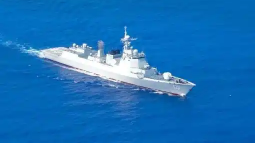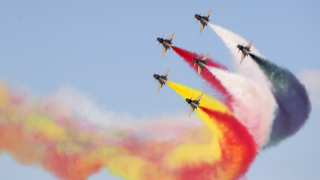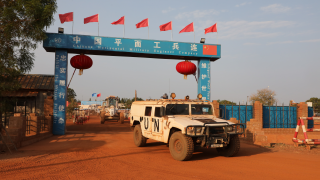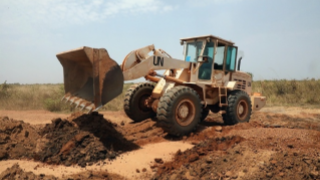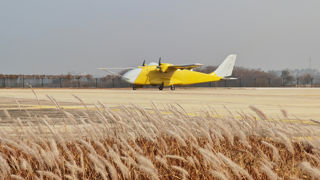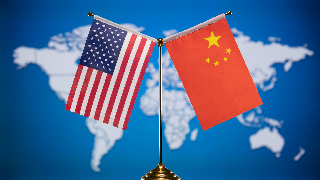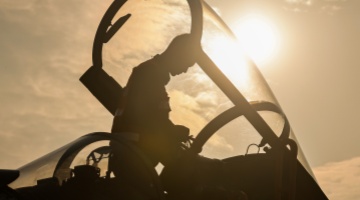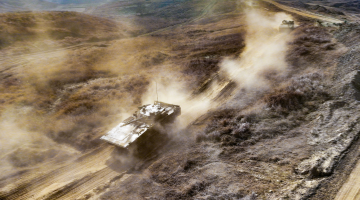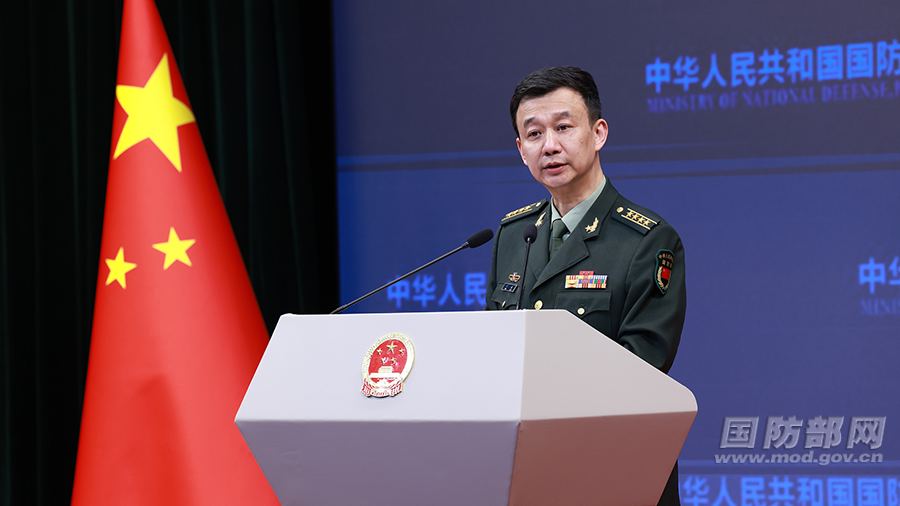
Senior Colonel Wu Qian, spokesperson for the Ministry of National Defense (MND) of the People's Republic of China (PRC), releases news at a regular press conference on the afternoon of December 28, 2023. (mod.gov.cn/Photo by Zhang Zhicheng)
(The following English text of the press conference is for reference. In case of any divergence of interpretation, the Chinese text shall prevail.)
Senior Colonel Wu Qian: Friends from the media, good afternoon. Welcome to this month's regular press conference of the Ministry of National Defense. I have two pieces of news to announce at the top.
The first message is about China's military training work in 2023.
Since the beginning of the year, the Chinese military has thoroughly studied and followed the guiding principles of the 20th CPC National Congress, and focused on achieving the military's centenary goal and improving combat readiness. We have upheld realistic training for real combat, joint training for joint operations, strengthening training through technology, and running training in accordance with law, and expedited the transformation and upgrade of military training. Firstly, we have consolidated the foundation for training. The on-site meeting on basic training was organized to promote models and measures including specialized teaching, integrated training, simulation training, and standardized assessment. The military has striven for new transformation and development of basic training to lay the foundation for fighting and winning wars. Secondly, we have strengthened realistic training for real combat. Guided by the concept of "training for joint operations", the armed forces has organized realistic training based on real threats on a regular basis, and carried out force-on-force training at different levels in various areas. This has elevated training in real combat conditions. Thirdly, we have improved training with technological application. Quality and efficacy of military training were improved with further application of concepts including "technology+", "scientist+", and "cyber+" and wider use of training bases, simulation systems and online platforms. Fourthly, we have enhanced cooperation and exchanges with foreign militaries on military training. The military conducted 34 joint exercises and training and international military games with 37 countries, and remained open to expanding and upgrading its international cooperation on military training.
On our new journey in the new year, service members will thoroughly follow Xi Jinping Thought on Strengthening the Military, conduct realistic military training in a combat-ready posture, and resolutely fulfill the missions and tasks entrusted by the Party and the people in the new era.
The second oneis about the China-Arab States Symposium on Special Operations and Counter-Terrorism. The PLA Southern Theatre Command hosted the China-Arab States Symposium on Special Operations and Counter-Terrorism from December 26th to 30th in Guangzhou. Leaders of special operations and counter-terrorism departments and troop commandersfrom countries including Saudi Arabia, Qatar and Oman attended the event.
Under the theme of "Focusing on special operations and counter-terrorism cooperation, Building a China-Arab community with a shared future", delegates had an in-depth exchange of views on topics including new trendsofregional terrorism and joint efforts in response,formation, training and operationsof special operations and counter-terrorism forces, special operations and counter-terrorism in urban areas,combating piracy and maritime terrorism, etc. This event aims to deepen exchanges and cooperation between China and Arab countries onspecial operations and counter-terrorism, and build a China-Arab community with ashared future.
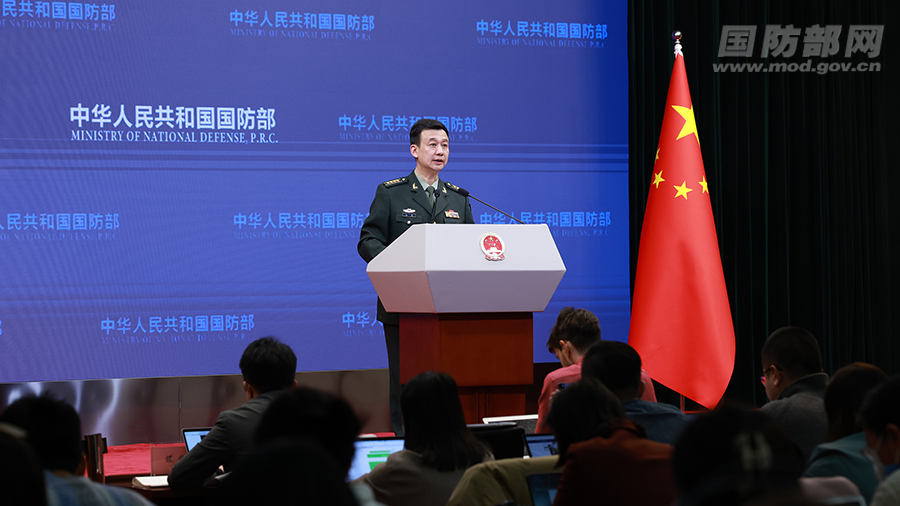
Senior Colonel Wu Qian, spokesperson for the Ministry of National Defense (MND) of the People's Republic of China (PRC), releases news at a regular press conference on the afternoon of December 28, 2023. (mod.gov.cn/Photo by Zhang Zhicheng)
Question: On December 21st, General Liu Zhenli, member of the Central Military Commission(CMC) and Chief of the Joint Staff Department of the CMC, had a video call with General Charles Brown, Chairman of the Joint Chiefs of Staff of the US military, at the request of the latter. Could you please brief us on relevant measures to be taken by China and the United States to further develop their mil-to-mil ties?
Answer: During their San Francisco meeting last month, the heads of state of China and the US agreed to resume, on the basis of equality and respect, high-level military-to-military communication, the China-U.S. Defense Policy Coordination Talks, and the China-U.S. Military Maritime Consultative Agreement meetings, and to conduct telephone conversations between theater commanders. On the night of December 21st, General Liu Zhenli, Chief of the Joint Staff Department of the Central Military Commission (CMC), had a video call with General Charles Brown, Chairman of the Joint Chiefs of Staff of the US military. The two sides exchanged candid and in-depth views on implementing the important military-related consensus reached between the two heads of state in San Francisco and on other issues of common interest. The video call yielded positive and constructive outcomes. Going forward, we expect the US side to work with us in the same direction and take concrete actions on the basis of equality and respect to promote the sound and steady development of China-US military-to-military relationship. As for specific exchange programs, the defense authorities of the two countries are in communication and coordination with each other. We will release relevant information in due course.
Question: President Xi Jinping recently paid a successful visit to Vietnam. The two sides jointly witnessed the signing of more than 30 documents on bilateral cooperation in defense and other areas. The China-Vietnam joint statement pointed out that security cooperation is one of the pillars of China-Vietnam relations, and both sides agreed to strengthen cooperation mechanisms in national defense and other areas. Please tell us more about the military exchanges and cooperation between China and Vietnam and the future arrangements.
Answer: Recently, General Secretary of the CPC Central Committee and President Xi Jinping paid a state visit to Vietnam. The two sides jointly announced a new characterization of the relationship between the two parties and two countries, working together for a China-Vietnam community with a shared future that carries strategic significance on the basis of deepening the comprehensive strategic cooperative partnership.
In recent years, the two militaries have seen frequent high-level interactions, and the cooperation in border exchanges, personnel training, and medical service has yielded fruitful results. China is ready to work together with Vietnam to earnestly implement the important common understandings reached between the top leaders of the two countries and Parties, strengthen high-level exchanges, enhance institutionalized cooperation and deepen exchanges between services and arms and in specilized areas, so as to continuously enrich our bilateral relations and deliver benefits to both peoples.
Question: The leadership election in the Taiwan region will be held in January next year. According to Taiwan's militaryauthorities, the military troops in Taiwanwill remain highly alert during the election, closely monitor the PLA's movesand prepare to respond with prudence. What is your comment on that?
Answer: The Democratic Progressive Party (DPP) authorities are deliberately hyping up the so-called "mainland's military threat" and playing up the tension to seek electoral benefits. The PLA is well aware of the movesof Taiwan's military, and will, as always, take all necessary measures to firmly safeguard China's national sovereignty and territorial integrity.
Question: I have two questions. First, US President Joe Biden recently signed the National Defense Authorization Act for Fiscal Year 2024, which authorized higher military spending and included measures to enhance the US deterrence in the Indo-Pacific region, counter Chinese military activities in the Indo-Pacific region, and assist Taiwan in strengthening its defense. What's your response for that? The second question is that the US Department of Defense recently announced that the sale of equipment worth $300 million to Taiwan has been approved to improve its ability to respond to the so-called threats from the mainland. What is your comment on this?
Answer: The US Act makes groundless hypes about the so-called "China military threat", grossly interferes in China's internal affairs, and severely harms China's national sovereignty, security and development interests. The Chinese military strongly deplores and firmly opposes to that.
The US military expenditure tops the world and is larger than those of the next nine countries combined, accounting for 40% of the total global military expenditure. On the one hand, the US is accelerating its military development, intensifying military deployment in the Asia-Pacific, strengthening bilateral military alliances, and piecing together AUKUS and QUAD. On the other hand, it is making an issue of China, hyping up the so-called "China military threat" out of thin air. Such manipulations intensify block confrontation and arms race and cause a severe impact on the current international security system and global governance system. We urge the US to abandon the out-dated security vision and zero-sum cold war mentality, view China and China's military development in an objective and rational light, instead of being obsessed with the pursuit for hegemony.
The Taiwan question is purely China's internal affair, which brooks no foreign interference. We firmly oppose any country to have official and military contact with Taiwan in any form. The US is manipulating the Taiwan question in various forms, which is a very dangerous gamble. We urge the US to fully realize the severe harm of the China-related content in the NDAA, stop arming Taiwan under any excuses and by any means, stop its provocations by using Taiwan to contain China, and take concrete actions to maintain regional peace and stability.
As for the second question, a spokesperson for the Ministry of National Defense has already made responses recently. I want to emphasize two things here. First, "using Taiwan to contain China" is doomed to fail. Second, "seeking Taiwan independence by force" is a dead end.
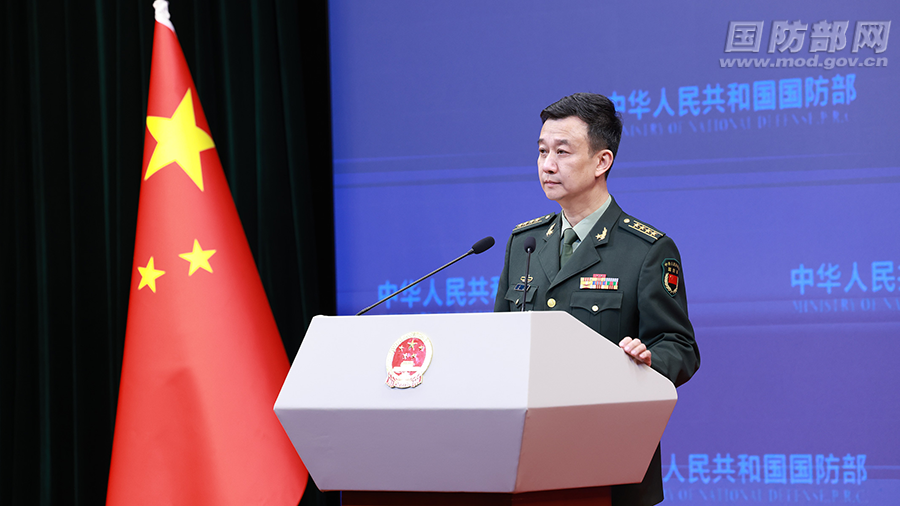
Senior Colonel Wu Qian, spokesperson for the Ministry of National Defense (MND) of the People's Republic of China (PRC), releases news at a regular press conference on the afternoon of December 28, 2023. (mod.gov.cn/Photo by Zhang Zhicheng)
Question: It is reported that the Philippine government and military officials said many times that the China Coast Guard used water cannons to attack and rammed Philippine vessels near Ren'ai Jiao, causing tensions in the region. Furthermore, the Philippine side accused China of using long-range sonic-devices and military grade lasers to attack Philippine sailors. What's your comment on that?
Answer: This is purely false hype. The Philippine side, in disregard of repeated warnings from the Chinese side, insisted on sending vessel to intrude into the adjacent waters of China's Ren'ai Jiao, and provocatively rammed a China Coast Guard vessel and caused scratch. Such behavior is very dangerous and extremely unprofessional. The China Coast Guard took necessary enforcement measures in accordance with law, which were totally justified and legitimate. We noted that the Philippine side had claimed to conduct humanitarian supplies. However, those supply vessels carried many journalists and propagated disinformation.
In my view, this is not humanitarian supply at all, it is to deliberately create an incident, play victim and make a show in the name of humanitarian supply. As for the so-called "sonic" or "laser" weapons, this is entirely groundless accusation. China has no intention or necessity to use such devices. China is always committed to resolving differences through dialogue and consultation and making joint efforts to maintain maritime stability, but we will not turn a blind eye towards the Philippines' repeated provocations and harassment.
Question: It's reported that the US Secretary of Defense announced the establishment of a multinational maritime force for security in the Red Sea. The US State Department spokesperson said that the US "would welcome China playing a constructive role in trying to prevent" Houthi attacks on ships in the Red Sea. What's your comment on this?
Answer: The Red Sea is an important international trade route for goods and energy. Safeguarding the security and stability of the region serves the common interest of the international community. China stands for protecting the safety of international sea lanes and at the same time addressing both the symptoms and root causes of regional hot-spot issues through dialogue, consultation and political means.
Question: French ambassador to the Philippines said that France planned to conduct joint air and maritime patrol with the Philippines in the South China Sea. It is also reported that recently, India and the Philippines conducted a joint maritime exercise in the South China Sea. What's your comment?
Answer: We have noted relevant reports. China always emphasizes that defense and security cooperation between relevant countries should not harm the interests of a third party or undermine regional peace and stability.
Maritime disputes between China and the Philippines are issues between the two countries, and no third party has the right to intervene. China will remain on high vigilance and take necessary measures to resolutely safeguard its national sovereignty, security, and maritime rights and interests.
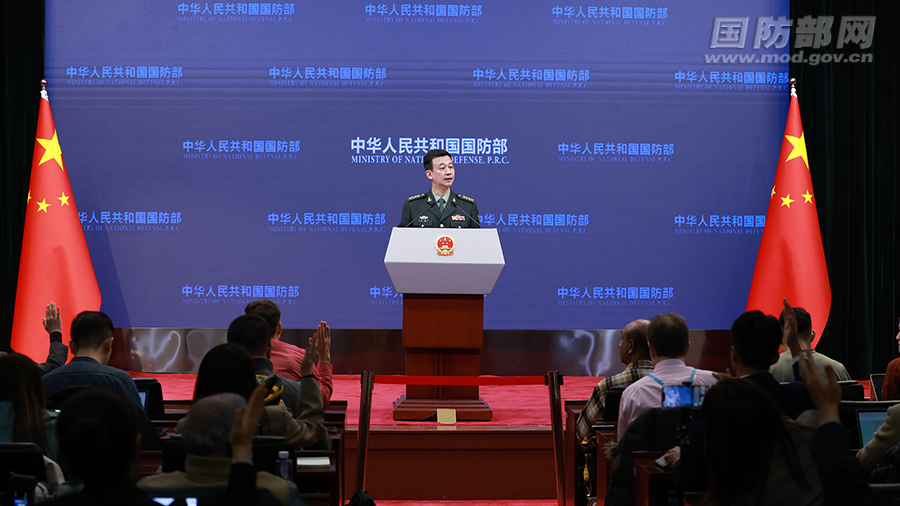
Senior Colonel Wu Qian, spokesperson for the Ministry of National Defense (MND) of the People's Republic of China (PRC), releases news at a regular press conference on the afternoon of December 28, 2023. (mod.gov.cn/Photo by Zhang Zhicheng)
Question: It is reported that Regulations on the Military Academy Enrollment of High School Graduates has recently been jointly released by the Ministry of Education and the CMC functional organs including the Political Work Department, Logistic Support Department, Training and Administration Department, and National Defense Mobilization Department. Could you please brief us on the content and highlights of the Regulations?
Answer: Following Xi Jinping Thought on Strengthening the Military and the military educational guideline for the new era, Regulations on the Military Academy Enrollment of High School Graduates has been revised and released to integrate the strategy of strengthening the military through talent development into the whole process of the recruitment by military education institutions. The regulations will play an important role in attracting talent to contribute to the cause of building a strong and world-class military.
There are four points to highlight First, the regulations improves the accountability system. Relevant duties have been added to national departments for educational administration to strengthen top level coordination between the military and civilian sectors. The process of recruitment has been restructured and responsibilities of relevant departments have been further clarified. Tasks of military academies and provincial military commands have been made clear to ensure smooth and efficient military medical examination, admission, enrollment and conscription. Second, the regulations optimizes criteria for application and admission. It lowers the minimum age for application and regulates that applicants must pass high school PE exam. Children of martyrs shall be awarded extra enrollment test points. Children of both service members killed in actions and disabled military personnel classified from grade one to four shall have priority of admission over other applicants with the same eligibility. Third, the regulations refines policies for recruitment. It details the number of participants in interview and physical examination and time limit for the whole process to standardize the procedure. The admission to application ratio of military academies will be tuned to be the same as that of civilian universities. It requires that military academies have a regular mechanism for enrollment promotion to provide information to students and their parents. Fourth, the regulations emphasizes transparent enrollment. It refines the supervision mechanism and specifies requirements on the adjustment to recruitment plans, political assessment, interview, physical examination, application and admission, which provides a strong guarantee for fair competition and selection.
The cause of strengthening the military is waiting for you. Military academy is a forge for the brave, a cradle of the strivers, and a natural choice for those who want to serve the country. We welcome more young aspirants to apply for military academies and join the military. Youth shines the brightest when dedicated to the motherland and resonating with the times.
Question: The US media recently reported that Taiwan is planning to send about 600 military personnel to the US to receive training on weapons that Taiwan has purchased but not yet received. What's your comment on this?
Answer: The Taiwan question is purely an internal affair of China, which brooks no external interference. The development of military ties between the US and China's Taiwan region has severely violated the one-China principle and the stipulations of three China-US joint communiqués. This move has also seriously undermined China's sovereignty and security interests, harmed peace and stability across the Taiwan Strait, and sent a wrong message to the "Taiwan independence" separatist forces. We urge the US to pull back before it is too late, stop its dangerous moves of arming Taiwan, and take concrete actions to honor its commitment of not supporting "Taiwan independence". Those who play with fire will get themselves burned. We sternly warn the DPP authorities that soliciting foreign support to seek "Taiwan independence" by force is doomed to failure.
Question: Taiwan's military authorities recently claimed that since December this year, a number of sounding balloons from the mainland have crossed the so-called "median line of the Taiwan Strait". Happening prior to the leadership election of the Taiwan region, this sparked some speculation. What's your comment on this?
Answer: As for the balloon issue, you may refer to the competent department. Taiwan is an inalienable part of China and there is no so-called "median line of the Taiwan Strait". Hyping up the so-called "mainland intervention in Taiwan's election" is nothing but the DPP authorities' old electoral trick to provoke confrontation and swindle votes. More and more people in Taiwan have seen through it.
Question: Russian President Vladimir Putin recently said at his annual news conference that the level of Russia-China cooperation is "unprecedented". The two sides are actively implementing the consensus reached by the two heads of state and "are engaged in military, economic and other cooperation". "The Russia-China relations constitute a major factor in guaranteeing global stability." What's your comment on that?
Answer: We have noted President Putin's positive comments on bilateral relations including China-Russia military relations. Under the strategic guidance of the two heads of state, recent years have witnessed steady development of China-Russia relationship, with deepening military cooperation and enriched strategic connotations of bilateral relations.
The Chinese military is willing to work with the Russian military to fully implement the important consensus reached between the two heads of state, further strengthen strategic communication and coordination, conduct joint maritime and air patrols on a regular basis, step up exchanges and cooperation between the two militaries in areas including joint training and exercises and personnel training. We will further deepen military mutual trust, jointly implement the Global Security Initiative, work together to safeguard international equity and justice, and make new contributions to international and regional security and stability and building a community with a shared future for mankind.
Question: It is reported that the US Department of Defense is planning to reclaim the North Airfield on the island of Tinian, 160 kilometers to the north of Guam. The airfield will become a new strategic pivot for the US military after its rehab. What's your comment on this?
Answer: The US is stepping up its forward military deployment in the Asia-Pacific, which has escalated tensions in the region. Regional countries should all stay on high alert against this. The Chinese military will pay close attention to relevant moves, and firmly safeguard its national sovereignty and maritime rights and interests and maintain peace and stability in the Asia-Pacific region.
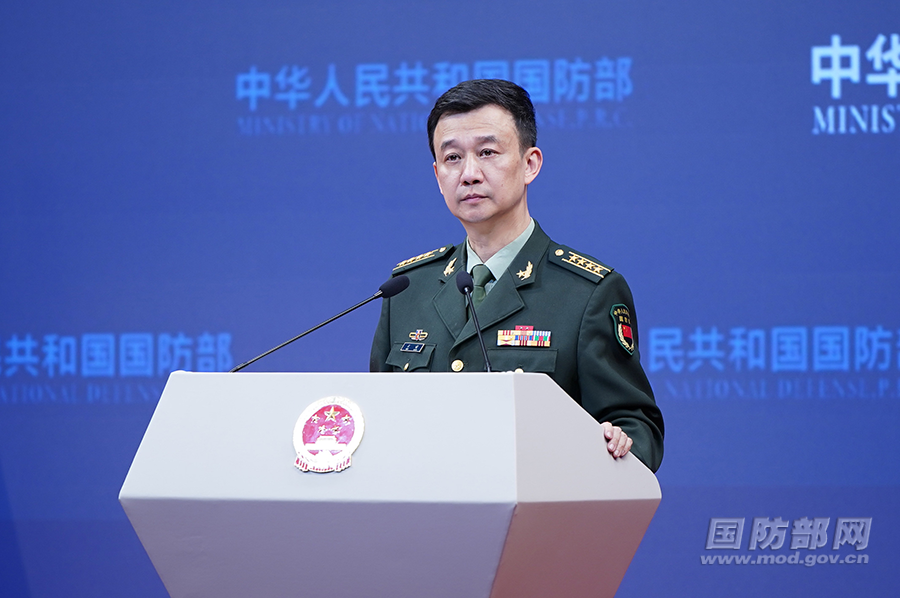
Senior Colonel Wu Qian, spokesperson for the Ministry of National Defense (MND) of the People's Republic of China (PRC), releases news at a regular press conference on the afternoon of December 28, 2023. (mod.gov.cn/Photo by Zhang Zhicheng)
Question: It is reported that officials of the US Department of Homeland Security recently claimed that hacking groups affiliated with the Chinese military are "ramping up their ability to disrupt key American infrastructure". What's your comment on that?
Answer: The remarks made by the US side are groundless and are pure smears. It's known to all that it is the US that is the culprit of hacking and is notorious on cyber security with the well-known PRISM. The US should firstly offer a proper and clear explanation to the international community before making unfounded accusations against China.
According to statistics, in 2020, China captured over 42 million computer malware samples, 53.1 percent of which were from the US. In addition, the number of malware control servers abroad, which controlled computer hosts in China, reached 52,000, of which about 19,000 were located in the US, ranking the top. We urge the US side to stop hacking against China, stop smearing and discrediting China in the field of cyber security, and stop hyping up the so-called "China cyber threat". The Chinese side will take necessary measures to safeguard its own security and interests.
Question: Recently, earthquakes struck China's Gansu and Qinghai provinces. Please introduce the Chinese military's earthquake rescue and relief efforts.
Answer: After the earthquakes struck, President Xi Jinping attached great importance to the relief work and made important instructions, ordering the PLA and the People's Armed Police Force (PAP) to support local authorities for emergency rescue and disaster relief. Relevant military departments immediately activated the emergency response mechanism. The Western Theater Command and the PAP dispatched multiple teams of transportation, medical service, and engineering and chemical defense to the disaster-struck areas for the search and rescue of trapped victims. Officers and soldiers carried out medical treatment, road clearance, supplies transportation, and disaster relief and rescue, making every effort to protect the safety of people's lives and property.
As of 6 p.m. on December 26, the PLA and the PAP have all together deployed 2447 service members and 1083 militia personnel, 12 aircraft, and 501 vehicles and engineering equipment. They relocated 13,800 peopleprovided medical treatment to 36,000 people, set up 2,585 tents, transported more than 17,000 tons of supplies, cleared 15 kilometers of roads, cleaned up more than 1,300 cubic meters of debris, and provided more than 98,000 portions of hot meal.
Serving the people wholeheartedly is the fundamental purpose of the people's military. Officers and soldiers of the task troops care about people affected by the disaster and are fighting relentlessly on the front line of earthquake relief and rescue. They are determined to fulfill the earthquake relief and rescue tasks assigned by the Party and the people.
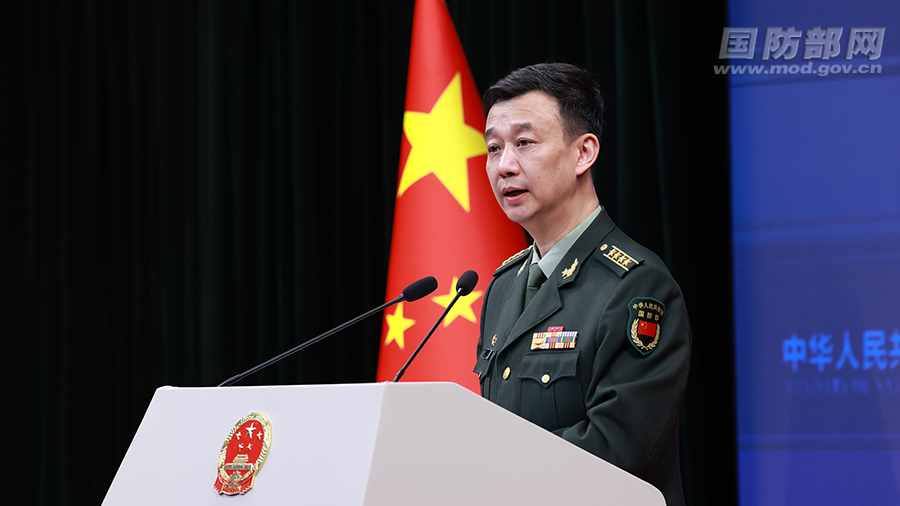
Senior Colonel Wu Qian, spokesperson for the Ministry of National Defense (MND) of the People's Republic of China (PRC), releases news at a regular press conference on the afternoon of December 28, 2023. (mod.gov.cn/Photo by Zhang Zhicheng
Question: Just before the press conference, I noticed a short video of the PLA Navy carrying out escort missions played on the big screen. Thismonth marks the 15th anniversary of China's dispatch of naval vessels for escort missions in the Gulf of Aden. Please brief us on the escort missions conducted by the PLA Navy.
Answer: First, I'd like to share with you a set of data. As of December this year, the PLA Navy has sent more than 150 ships and over 35,000 troops in 45 batches to the Gulf of Aden and the waters off the coast of Somalia to carry out escort missions. The PLA Navy ships have safely escorted over 7,200 Chinese and foreign ships in more than 1,600 batches, and rescued and protected nearly 100 ships of various types, of which more than 50 percent were foreign ships. The past 15 years of escort missions in the Gulf of Aden have witnessed the staunch efforts made by the PLA Navy to accelerate its transformation towards a strong maritime force, and demonstrated the commitment of the PLA Navy troops to embracing the world and safeguarding peace. In its missions of expelling pirates, conducting emergency evacuation of Chinese nationals and humanitarian rescue operations, the PLA Navy stays committed to building a community with a shared future for mankind and a maritime community with a shared future, and actively contributes to safeguarding China's overseas rights and interests and the safety of international sea lanes.
Question: According to the spokesperson of the US Department of Defense, Chinese military vessels lately conducted “unsafe operational behavior against Philippine vessels operating lawfully in the South China Sea”, which is “irresponsible. “US defense officials remain in close consultation with counterparts from the Philippines.” The US' “commitment to upholding its obligations under its Mutual Defense Treaty with the Philippines is ironclad”. What's your view on that?
Answer: The US is misrepresenting facts and making groundless accusations on China's legitimate actions of rights protection. We strongly deplore and firmly oppose that. China has indisputable sovereignty over Nansha Qundao and the adjacent waters, including Ren'ai Jiao. The US, out of selfish calculations, incited and emboldened the Philippines to infringe upon China's sovereignty and make provocations, and attempted to threaten and coerce China with the US-Philippines Mutual Defense Treaty. It will not work on China.
Issues related to Ren'ai Jiao are between China and the Philippines and have nothing to do with any third party. We urge the US to immediately stop meddling in the South China Sea issue, stop instigating the Philippines' infringements and provocations, and maintainregional peace and stability with concrete actions.
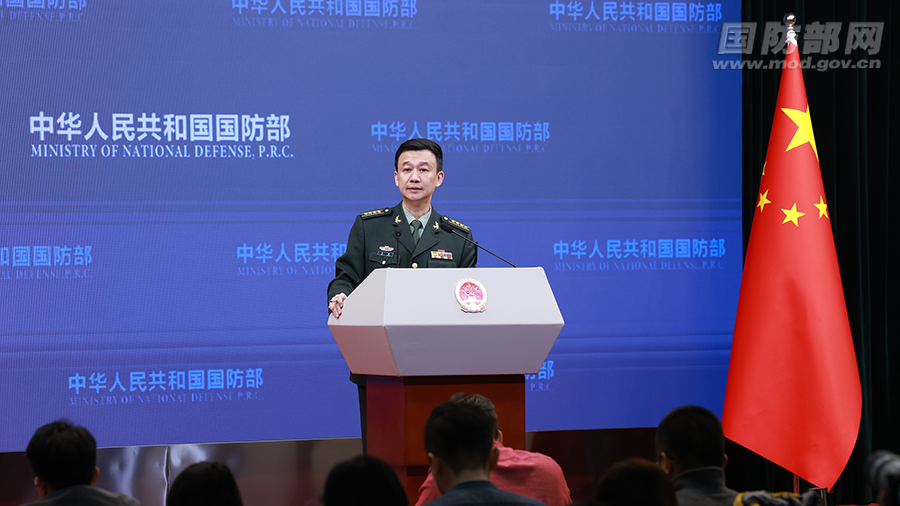
Senior Colonel Wu Qian, spokesperson for the Ministry of National Defense (MND) of the People's Republic of China (PRC), releases news at a regular press conference on the afternoon of December 28, 2023. (mod.gov.cn/Photo by Zhang Zhicheng
Question: The media noticed that there have been many highlights and remarkable achievements in China's military diplomacy in 2023. Can you give us more details, please?
Answer: The year 2023 marks the first year for fully implementing the guiding principles laid down at the 20th CPC National Congress. On military diplomacy, we acted on Xi Jinping Thought on Strengthening the Military and Xi Jinping Thought on Diplomacy, followed the guidance of head-of-state diplomacy, took high-level exchanges as important means, focused on practical cooperation and gave emphasis to multilateral platforms. We have broken new ground, forged ahead with enterprise and fortitude, enhanced the quality and efficiency of international military cooperation and achieve high-quality development.
First, military diplomacy served the overall political and diplomatic objectives of China. Under the strategic guidance of head-of-state diplomacy, leaders of the Central Military Commission (CMC) had strategic communication with defense and military leaders of Russia, the United States, Vietnam, Cambodia, Pakistan, South Africa, etc., and deepened bilateral strategic cooperation. The Chinese military enhanced consultation and dialogue and expanded practical cooperation with relevant militaries to put into practice the achievements of head-of-state diplomacy.
Second, military diplomacy resolutely safeguarded national sovereignty,security and development interests. In response to the negative and wrong rhetoric and infringements and provocations made by certain countries on the Taiwan question and the South China Sea issue, while taking actions to protect our rights in accordance with laws and regulations, the Chinese military also made diplomatic representations, and timely refuted, warned and exposed the wrongdoings and negative moves of relevant countries, and made clear China's positions through MND spokesperson and the media.
Thirdly, we have expanded foreign-related military operations. The PLA organized and conducted 34 joint training, exercises and international military games including the China-Russia "Beibu Unity-2023" joint exercise, the "Aman youyi-2023" joint exercise with southeast Asian countries, the China-Cambodia "Golden Dragon 2023" joint exercise, the China-Laos "Friendship Shield-2023" joint exercise. Through expanded bilateral and multilateral exercises and training, the PLA has deepened mutual trust and cooperation with the militaries of relevant countries, and played a positive role in maintaining regional stability.
Fourthly, we have made innovative efforts in multilateral diplomacy. The tenth Beijing Xiangshan Forum and the third China-Africa Peace and Security Forum hosted by China were widely attended and welcomed. We attended multilateral events including the Shangri-La dialogue, the Defense Ministers' Meeting of the Member States of the Shanghai Cooperation Organization, the ASEAN Defense Ministers Meeting Plus (ADMM+), and actively introduced major initiatives such as the Global Security Initiative and promoted international consensus for peace and cooperation.
Fifthly, we have contributed to building a community with a shared future for mankind. The PLAN Ark Peace hospital ship visited Kiribati, Tonga, Vanuatu, Solomon Islands, and Timor-Leste. The Chinese military medical expert teams continued to work in Zambia, Cambodia and Laos, and provided medical service to the local people. PLA Air Force Y-20 transport aircraft carried out humanitarian relief missions to Afghanistan and Nepal. PLA Navy vessels rushed to Sudan to evacuate Chinese nationals. The Chinese military also actively participated in UN peacekeeping and vessel protection operations, consistently providing public security goods to the international community.
Embracing the world for peace, the Chinese military will always follow the guidance of Xi Jinping Thought on Socialism with Chinese Characteristics for a New Era, and stay committed to expanding and deepening relations with foreign militaries, strengthening practical exchanges and cooperation, and making due contributions to world peace and common development.
Question: Russian Foreign Minister recently stated in an interview that "the US decided to break off the Intermediate-Range Nuclear Forces (INF) Treaty because Washington needs missiles banned under it, including against China". What's your take on that?
Answer: The INF Treaty, a bilateral treaty signed between the US and the former Soviet Union during the Cold War, has been conducive to maintaining global strategic balance and stability. The unilateral withdrawal of the US is bound to cause negative impacts in various aspects. China opposes the US unilateral withdrawal from the treaty and the multilateralization of the treaty. What needs to be emphasized is that China pursues a national defense policy that is defensive in nature and a military strategy of active defense, and will firmly safeguard its national security and interests.
Question: It is reported that on December 22, the Japanese government adopted the Three Principles on Transfer of Defense Equipment and Technology and its implementation guidelines, further easing restrictions on arms export. The reports said that it was the first time for the Japanese government to revise its export regulation on defense equipment in ten years since 2014. What is your comment on that?
Answer: In recent years, Japan has repeatedly breached its commitments under the pacifist constitution and exclusively defense-oriented policy, and played tricks in the military and security area. Such moves have aroused serious vigilance and concerns among the international community. We urge Japan to draw lessons from its aggression history, respect the security concerns of its neighboring countries, stay committed to the path of peaceful development and earn the trust of its Asian neighbors and the international community with concrete actions.
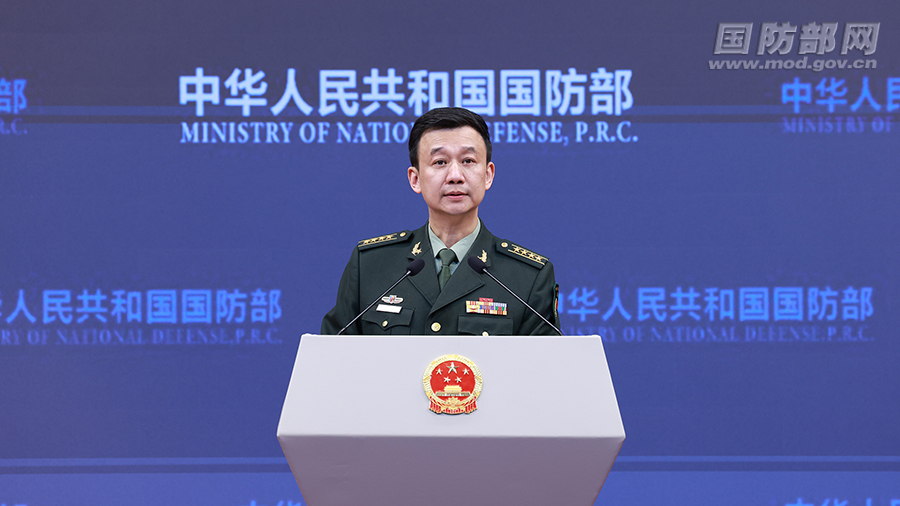
Senior Colonel Wu Qian, spokesperson for the Ministry of National Defense (MND) of the People's Republic of China (PRC), releases news at a regular press conference on the afternoon of December 28, 2023. (mod.gov.cn/Photo by Zhang Zhicheng
Question: This year marks the 45th anniversary of Reform and Opening up and the 10th anniversary of the convening of the Third Plenary Session of the 18th CPC Central Committee. Please give us more details on the progress of deepening the national defense and military reform in recent years.
Answer: Since the 18th CPC national congress, under the strong leadership of the CPC Central Committee, the CMC and President Xi, the Chinese military has implemented the strategy of strengthening the military through reform in an all-round way with unprecedented resolve and endeavors. We have carried out the most profound and extensive reforms of national defense and the armed forces since the founding of the PRC to tackle institutional barriers, structural defects and policy-related problems hindering national defense and military development.
In the past decade, the national defense and military reform has made historic achievements and yielded a series of theoretical, systematic and practical outcomes. The people's armed forces have taken on new systems, a new structure, a new configuration, and a new look. Facts have proven that reform is a sure path to build a strong military and a key move for the PLA to achieve development and secure victories.
On the new journey, the Chinese military will take note of the new circumstances and requirements, focus on improving combat readiness, and make pioneering efforts. We will implement established reform tasks, consolidate the achievements of national defense and military reform, and strive to open up new prospects for strengthening the military through reform, so as to provide a strong drive for achieving the military's Centenary Goal.
Question: Recently, a Chinese MND delegation attended the UN Peacekeeping Ministerial in Ghana. The UN Under-Secretary-General for Peace Operations stated "China's commitment to continue sending troops and many other important pledges are very important". Please introduce the Chinese military's participation in UN peacekeeping operations in recent years.
Answer: Recently, the Chinese MND delegation attended the UN Peacekeeping Ministerial in Accra, Ghana. In its speech, the Chinese side introduced the vision of building a community with a shared future and the Global Security Initiative proposed by President Xi Jinping, and pledged that China will strengthen peacekeeping capability readiness, hold international training courses on peacekeeping and conduct exchanges on peacekeeping ideas and experience, so as to make greater contributions to world peace and security.
This year marks the 75th anniversary of the UN peacekeeping operations (UNPKOs). China is the largest troop contributing country among the permanent members of the United Nations Security Council and the second largest financial contributor to the UN peacekeeping budget. China has participated in 25 UN peacekeeping missions and has contributed more than 50,000 peacekeepers. As we speak, nearly 2,000 Chinese peacekeepers, mainly in engineering, transportation, medical, police, infantry and helicopter units, are deployed in the UN Headquarters and mission areas including South Sudan, the Democratic Republic of the Congo (DRC), and Lebanon. They have played an important role in maintaining world peace and security, bringing tranquility and stability to conflict zones and generating peace and hope for the world. The Chinese blue helmets have become a key force in UN peacekeeping operations.
Question: Foreign media recently reported that an Israeli cargo ship sent an escort request to the PLAN Urumqi, and was rejected by the Chinese side. Could you confirm this?
Answer: This is totally fake news and disinformation.
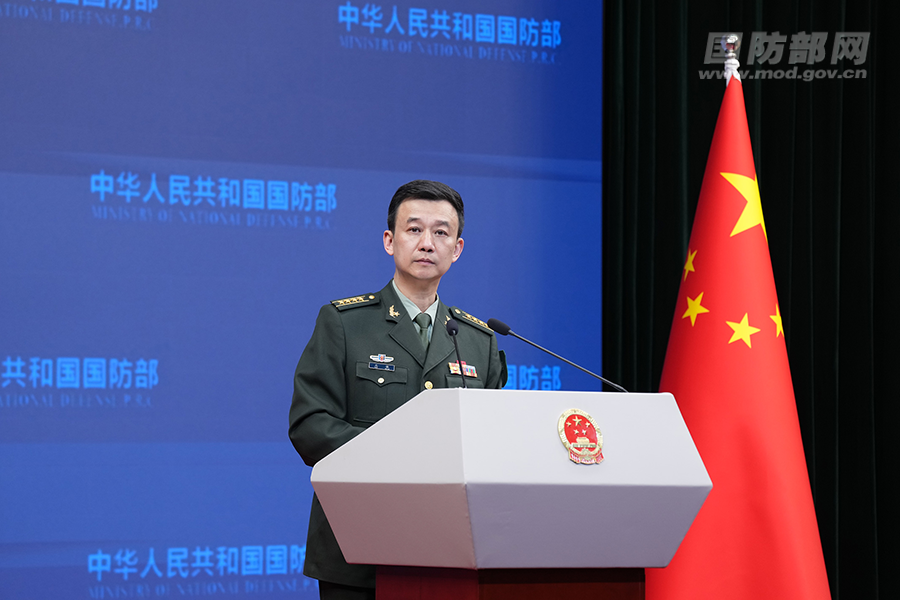
Senior Colonel Wu Qian, spokesperson for the Ministry of National Defense (MND) of the People's Republic of China (PRC), releases news at a regular press conference on the afternoon of December 28, 2023. (mod.gov.cn/Photo by Zhang Zhicheng
Question:The US Pentagon recently published an article on the US "force posture" in the so-called Indo-Pacific region in 2023, mentioning the forward stationing of "key military units to Japan, including a US Marine Littoral Regiment", and four additional military bases in the Philippines. The Pentagon said that this series of measures will make the US military posture in the Indo-Pacific region more mobile and lethal. Some analysts stated that the relevant US deployment is aimed at China. What is your comment on this?
Answer: The US has been intensifying its military deployment in the Asia-Pacific, which is full of Cold War mentality. It is for its selfish gains and to maintain its hegemony. The nature of such moves is to sow discords, stoke confrontation and undermine peace and stability. China will take all necessary measures to safeguard national sovereignty, security and development interests, and resolutely safeguard regional peace and stability.
Question: Recently, Chinese and Russian militaries conducted their seventh strategic air patrol. And Japan and the ROK said that the frequency of such air patrols between China and Russia has increased from once a year in 2019 to twice a year in 2022 and 2023, with a tendency towards larger scale and longer duration. Some Western media commented that this was intensifying the Cold War-style military confrontation in Northeast Asia. What is your comment on that?
Answer: I disagree with the so-called "intensifying confrontation" in your question. This joint patrol does not target any third party and has nothing to do with the current international and regional situation.
Wu Qian: If there are no more questions, that concludes the Q&A session. Before wrapping up, I have one bonus for you. As the new year approaches, we have made a special video clip that captures some of the loving moments of the Chinese military in 2023.
Love is the most beautiful language in the world. The video we just watched captures some of the loving moments of the Chinese military over the past year. Service members missed the taste of the food cooked by their mother; they missed their families and loved ones that are far away; they rescued and helped people affected by disasters; they kissed the boundary marker of their motherland. They are courageous and loyal. They are soft inside to be empathetic but tough outside to shoulder the responsibilities to defend their country.
There's a kind of strength that can earn our respect, and there is a kind of love that can strike our heartstrings. The love of the Chinese service members lies in their stationing on the borderlines that extend thousands of miles, their determination to charge forward in face of danger, and their selflessness to sacrifice their own family reunion for the reunion of more families during festival times. I always believe that love is commitment, responsibility and, above all, faith. Looking ahead to the new year, please remember that wherever you are, the Chinese military will always be the strong shoulder that you can rely on. I'd like to wish you all a Happy New Year. I hope there will be love in your hearts and light in your eyes, and that what you see will all be blessed with happiness and joy.
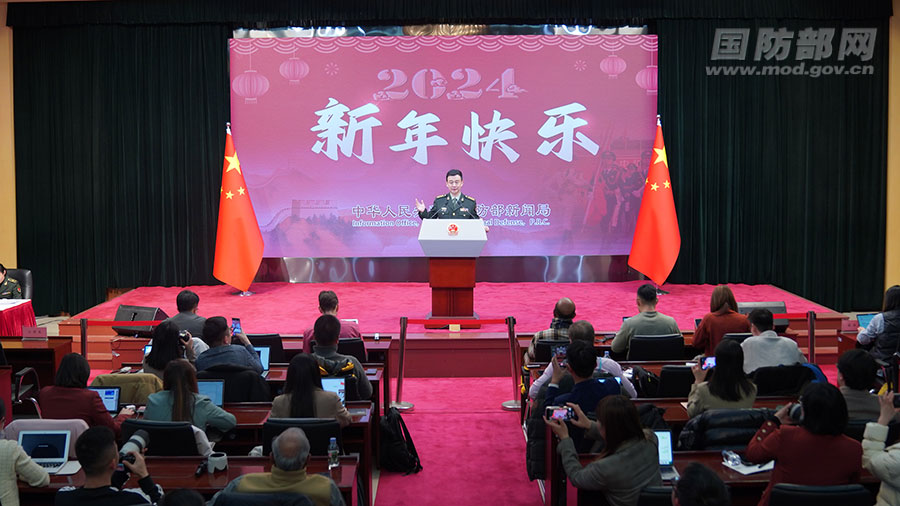
Senior Colonel Wu Qian, spokesperson for the Ministry of National Defense (MND) of the People's Republic of China (PRC), releases news at a regular press conference on the afternoon of December 28, 2023. (mod.gov.cn/Photo by Zhang Zhicheng
That concludes today's press conference. Thank you.

